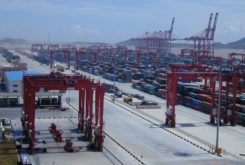As Chinese President Xi Jinping lands in Lisbon for a two-day visit, Portuguese authorities will be extending the warmest of welcomes, even as the ever closer business ties between both countries begin to put a strain between Portugal and the European Union.
The most recent update of the ranking by the Rhodium Group and Mercator Institute for China Studies on biggest investments by China in terms of European countries´ GDP reveal that Portugal, along with Finland, was the country where Chinese capital inflows were more sizeable since 2000, in relation to its economy.
Chinese investment worth 3.1% of GDP – only slightly below Finland´s 3.2% – make Portugal the second eurozone country with the most Chinese investment, well above the 0.8% average for European Union countries.
The size of investment grew considerably during the 2011-2013 crisis, which forced the Portuguese Government to privatise its stake in utilities such as EDP – Energias de Portugal (which now has CTG – China Three Gorges as its main shareholder) or REN – Redes Energéticas Nacionais (controlled by China State Grid), and subsequently in banking or health, and has been mostly welcome in Portugal.
But this wave of investments has raised alarms in Brussels, and even more so after CTG launched a 10-billion euro takeover bid for EDP, dependent on the acceptance of the offer by the Portuguese government, that, through Prime Minister António Costa, almost immediately gave its “green light”.
For the offer to reach the market, CTG has to obtain regulatory authorisation in the various markets where EDP is present, namely the United States – which is currently entangled in a commercial dispute with China, and also with Brussels.
According to the Portuguese press, contacts regarding the deal are already ongoing.
The takeover offer established on 20 November as the European Parliament, the European Council, and the European Commission reached a political agreement on a framework for the analysis of foreign direct investment in the EU by third countries, including China, considered potential hidden “threats.”
“On the basis of the rules now agreed upon, member states will retain the power to analyse and potentially block direct investment from third countries for security reasons and of public order”, a note sent by the Austrian Presidency of the Council of the EU clarified.
The European institutions clarified that the measures targeted “foreign investors” who could seek to acquire “strategic assets that would enable them to control or influence European companies whose activities are essential for security and public order in the EU and in its member states”. While China was not specifically mentioned, it is widely considered to be the main investor in question.
The new regulation, which will have to respect the principle of non-discrimination and the protection of confidential information, will allow the European Commission to issue advisory opinions when it considers that a “planned or finalized” investment may affect security or public order in “one or more member states”.
The political agreement, however, which clarifies that the final decision on these investments will always belong to the member state concerned, has yet to be approved by a qualified majority by the member states.
Recently, socialist member of European Parliament (MEP) Ana Gomes, from Portugal, together with German colleague Elmar Brok, questioned directly the European Commission president, Jean-Claude Juncker, about foreign investment in strategic sectors of the European economy, in the light of the takeover bid launched by CTG over EDP.
In his answer to the MEPs, Juncker said that the EU needs “scrutiny on acquisitions by foreign companies targeting Europe’s strategic assets”, adding that the current legal framework limits intervention, making it up to the national regulatory authorities to analyse the risks of the operation. In a report adopted on 12 September on the state of relations between the EU and China, MEPs considered that Chinese investments are part of an overall strategy for companies controlled or financed by Beijing to take control of the banking and energy sectors, and of other supply chains.
According to the report adopted in plenary, recent research has shown that China has acquired assets in Europe worth USD 318 billion since 2008, an amount which does not include several mergers, investments, and joint-ventures. By 2017, 68% of Chinese investments in Europe came from public enterprises.
In the current European framework, EDP will be the “elephant in the room” for both countries´ authorities during the Chinese President´s visit to Lisbon due to the take-over offer, but also because of legal disputes; after announcing the takeover bid, CTG, which holds 23.27% of the share capital of EDP, along with other shareholders, decided at the end of September that it will resort to international arbitration under the protection of foreign investment in force, to ensure the payment of 285 million euros for alleged overcompensation in the calculation of the availability of power plants operating under CMEC (Contracts for Maintenance of Contractual Equilibrium) regime.
In a recent article, former Portuguese secretary of State Bruno Maçães says Portugal is currently facing “one of the most important foreign policy choices of the last decades” – in its adhesion to the Belt and Road initiative.
“Germany and the US have pressured the Portuguese Government to give Xi Jinping a negative answer, but the biggest pressures come from Paris, with president Macron informing, through diplomatic channels, that he will be very disappointed with Antonio Costa, if the reply is positive” to the Chinese strategy, Maçães wrote in an article published in Portugal´s main weekly, Expresso.
Before landing in Lisbon, President Xi Jinping resorted to (part-Chinese owned) weekly Diário de Notícias to defend Portugal´s participation in Belt and Road, suggesting partnerships in areas such as the so-called blue economy.
“We will actively develop the Blue Partnership, encourage strengthening of cooperation in the areas of scientific research related to the sea, exploration and protection of the sea and port logistics, among others, developing the blue economy, making the vast seas benefit our future generations,” he said.
Xi Jinping, who has been President of China since 2012, recalls economic cooperation during the period of the financial crisis, “when one after another, Chinese companies invested in Portugal and, by expanding their business outside China, contributed to the creation of work and the socio-economic development of Portugal”.
Portugal´s government has shown a keen interest in having Chinese companies invest in its Sines port, in particular the new Vasco da Gama terminal, as a point of entry for Belt and Road in Europe. Indeed, a framework agreement could be signed in the aftermath of president Xi Jinping´s visit to Lisbon, which will last until Wednesday.



